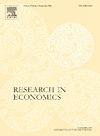Relative age, college satisfaction, and student perceptions of skills gained
IF 1.3
Q3 ECONOMICS
引用次数: 0
Abstract
School starting age policies typically result in academic cohorts where the oldest students are approximately a full year older than their youngest peers. A student’s relative age in their cohort has been shown to have significant effects on a growing list of outcomes, academic and non-academic. On average, relatively older students have been found to perform better in school, particularly during early education. Some evidence exists they continue to fare better in post-college labor markets. Soft skills, satisfaction with education, and collegiate differentials, generally, have received less attention. Using a sample of students from hundreds of U.S. colleges and universities, we estimate the effects of relative age on student satisfaction with higher education and their perceived gains in 13 knowledge and skill categories during undergraduate tenure. College GPAs are also examined. Controlling for other factors, relatively older students report smaller gains in a large number of skill and knowledge categories. In none of the categories available for analysis do they report higher average gains. This does not appear due to academic achievement or involvement, as they also earn similar grades, on average, and report feeling similarly satisfied with their overall collegiate experience and instruction specifically. Thus, while relatively older students earn similar grades and leave college no less satisfied, they perceive to have benefited less from higher education in terms of skill and knowledge gains.
相对年龄,大学满意度和学生对所获得技能的看法
学校的入学年龄政策通常会导致年龄最大的学生比年龄最小的学生大整整一岁。研究表明,学生的相对年龄对越来越多的学术和非学术成果都有显著影响。平均而言,年龄相对较大的学生在学校表现更好,尤其是在早期教育中。一些证据表明,他们在大学毕业后的劳动力市场上继续表现得更好。一般来说,软技能、对教育的满意度和大学差异受到的关注较少。使用来自数百所美国高校的学生样本,我们估计了相对年龄对学生对高等教育满意度的影响,以及他们在本科任期内对13个知识和技能类别的感知增益。大学gpa也会被审查。在控制其他因素的情况下,年龄相对较大的学生在许多技能和知识类别中获得的收益较小。在所有可用于分析的类别中,他们都没有报告更高的平均收益。这并不是因为学业成绩或参与度,因为他们的平均成绩也差不多,并且对他们的整体大学经历和具体的教学感到满意。因此,虽然年龄相对较大的学生取得了类似的成绩,离开大学时的满意度也没有降低,但他们认为在技能和知识方面从高等教育中受益较少。
本文章由计算机程序翻译,如有差异,请以英文原文为准。
求助全文
约1分钟内获得全文
求助全文
来源期刊

Research in Economics
ECONOMICS-
CiteScore
1.40
自引率
0.00%
发文量
37
审稿时长
89 days
期刊介绍:
Established in 1947, Research in Economics is one of the oldest general-interest economics journals in the world and the main one among those based in Italy. The purpose of the journal is to select original theoretical and empirical articles that will have high impact on the debate in the social sciences; since 1947, it has published important research contributions on a wide range of topics. A summary of our editorial policy is this: the editors make a preliminary assessment of whether the results of a paper, if correct, are worth publishing. If so one of the associate editors reviews the paper: from the reviewer we expect to learn if the paper is understandable and coherent and - within reasonable bounds - the results are correct. We believe that long lags in publication and multiple demands for revision simply slow scientific progress. Our goal is to provide you a definitive answer within one month of submission. We give the editors one week to judge the overall contribution and if acceptable send your paper to an associate editor. We expect the associate editor to provide a more detailed evaluation within three weeks so that the editors can make a final decision before the month expires. In the (rare) case of a revision we allow four months and in the case of conditional acceptance we allow two months to submit the final version. In both cases we expect a cover letter explaining how you met the requirements. For conditional acceptance the editors will verify that the requirements were met. In the case of revision the original associate editor will do so. If the revision cannot be at least conditionally accepted it is rejected: there is no second revision.
 求助内容:
求助内容: 应助结果提醒方式:
应助结果提醒方式:


